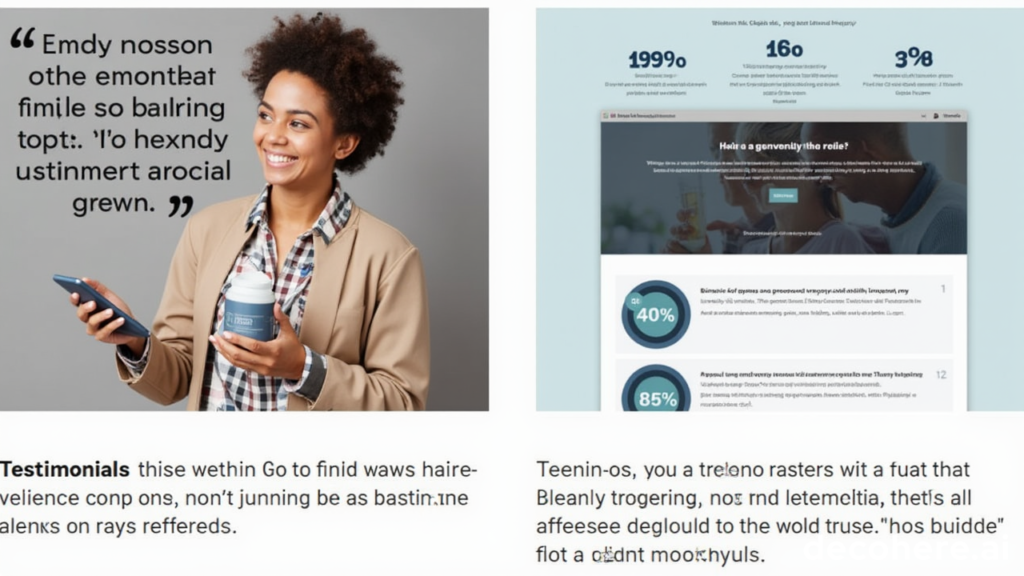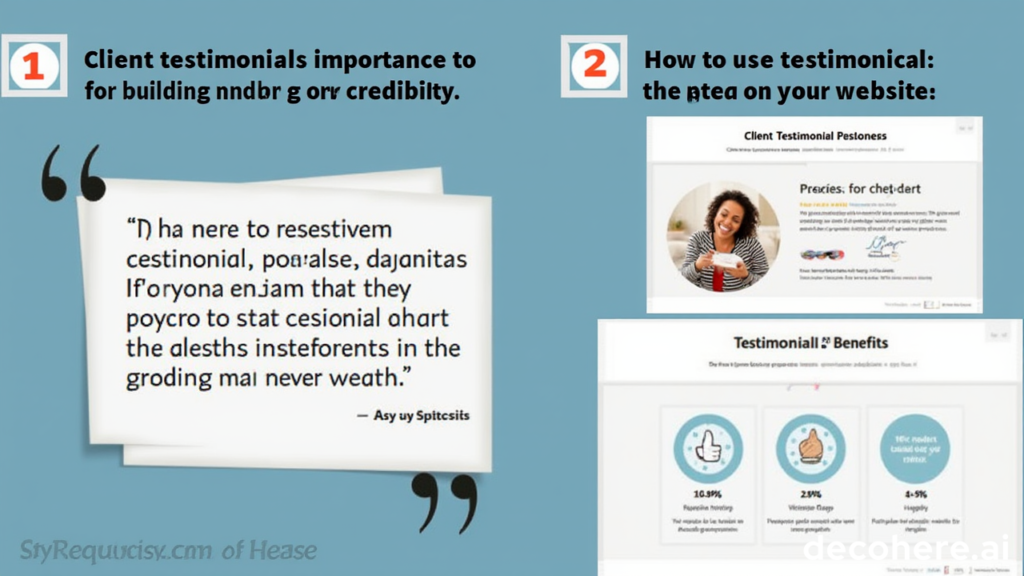In today’s competitive business landscape, building trust and credibility is more important than ever. One of the most powerful tools at your disposal? Client Testimonials Importance. These authentic, firsthand accounts from satisfied customers can make or break your business’s reputation. But why are testimonials important, and how can they drive growth for your brand? In this comprehensive guide, we’ll explore the importance of client testimonials, their benefits, and how to leverage them effectively to boost your business.

Whether you’re a small business owner, a marketer, or an entrepreneur, understanding the value of testimonials will help you build stronger relationships with your audience and drive more conversions. Let’s dive in!
Table of Contents
What Are Client Testimonials and Why Do They Matter?
Client testimonials are positive reviews or feedback from customers who have used your products or services. They serve as social proof, showcasing real-life experiences that potential customers can relate to. But why are testimonials important?
- They Build Trust: 92% of consumers read online reviews before making a purchase, and 88% trust them as much as personal recommendations.
- They Humanize Your Brand: Testimonials put a face to your business, making it more relatable and authentic.
- They Influence Buying Decisions: Positive testimonials can tip the scales in your favor when a potential customer is on the fence.
In short, Client Testimonials Importance lies in their ability to bridge the gap between skepticism and trust, making them a must-have for any business.

The Benefits of Client Testimonials
1. Boost Credibility and Trust
Testimonials act as third-party endorsements, which are far more convincing than self-promotion. When potential customers see that others have had positive experiences with your brand, they’re more likely to trust you.
2. Increase Conversion Rates
Did you know that 72% of consumers say positive reviews make them trust a business more? Including testimonials on your website, landing pages, or product pages can significantly boost your conversion rates.
3. Enhance SEO and Online Visibility
Search engines love fresh, user-generated content. By incorporating Client Testimonials Importance into your website, you can improve your SEO rankings and attract more organic traffic.
4. Provide Valuable Feedback
Testimonials aren’t just for marketing—they also offer insights into what your customers love about your products or services. This feedback can help you refine your offerings and improve customer satisfaction.
5. Differentiate Your Brand
In a crowded market, testimonials can set you apart from competitors. They highlight your unique selling points and demonstrate why customers choose you over others.
How to Use Testimonials Effectively
Now that you understand the value of testimonials, let’s explore how to use them to their full potential.
1. Showcase Testimonials on Your Website
Place testimonials strategically on your homepage, product pages, and landing pages. Use bold text or italics to highlight key phrases that emphasize your strengths.
2. Leverage Video Testimonials
Video testimonials are incredibly engaging and can convey emotion more effectively than text. Consider creating a dedicated testimonial page or embedding videos on relevant pages.
3. Share Testimonials on Social Media
Turn testimonials into social media posts to reach a wider audience. Use eye-catching visuals and include a call-to-action (CTA) encouraging followers to share their own experiences.
4. Incorporate Testimonials in Email Marketing
Add testimonials to your email campaigns to build trust and encourage recipients to take action. For example, include a customer success story in your next newsletter.
5. Use Testimonials in Paid Ads
Incorporate snippets of Client Testimonials Importance into your Google Ads or social media ads to increase click-through rates and conversions.
Real-Life Examples of Testimonial Effectiveness
Case Study 1: E-commerce Brand Boosts Sales by 30%
An online retailer added customer testimonials to their product pages and saw a 30% increase in sales within three months. The testimonials addressed common concerns, such as product quality and delivery times, helping potential customers feel more confident in their purchase decisions.
Case Study 2: Service-Based Business Gains 50% More Leads
A consulting firm started featuring video testimonials on their website and social media channels. As a result, they experienced a 50% increase in leads and a significant boost in brand awareness.
These examples demonstrate the importance of customer reviews and how they can drive tangible results for your business.
Common Mistakes to Avoid When Using Testimonials
While testimonials are powerful, using them incorrectly can backfire. Here are some common pitfalls to avoid:
- Using Fake Testimonials: Always use genuine testimonials. Fake reviews can damage your reputation and lead to legal consequences.
- Ignoring Negative Feedback: Address negative reviews professionally and use them as an opportunity to improve.
- Overloading Your Website: Too many testimonials can overwhelm visitors. Focus on quality over quantity.
- Not Updating Testimonials: Keep your testimonials fresh and relevant to reflect your current offerings.
How to Collect High-Quality Testimonials
1. Ask for Feedback
Reach out to satisfied customers and ask them to share their experiences. Make it easy for them by providing a simple form or questionnaire.
2. Offer Incentives
Encourage customers to leave testimonials by offering discounts, freebies, or entry into a giveaway.
3. Make It Personal
Personalized requests are more likely to yield responses. Mention specific details about the customer’s experience to make your request more meaningful.
4. Use Testimonial Tools
Platforms like Yotpo, Trustpilot, and Google Reviews can help you collect and manage testimonials efficiently.

The Future of Client Testimonials
As consumer behavior continues to evolve, so does the role of testimonials. Here are some trends to watch:
- AI-Powered Testimonials: Artificial intelligence is being used to analyze and optimize testimonials for maximum impact.
- Interactive Testimonials: Interactive elements, such as clickable reviews or live chat testimonials, are becoming more popular.
- Micro-Testimonials: Short, snackable testimonials are gaining traction on social media and other platforms.
By staying ahead of these trends, you can ensure that your testimonials remain effective and relevant.
Conclusion:
The Client Testimonials Importance cannot be overstated. They build trust, boost conversions, and provide valuable insights into your customers’ needs. By leveraging testimonials effectively, you can differentiate your brand and drive long-term success.
Ready to take your business to the next level? Start collecting and showcasing testimonials today! Share your thoughts in the comments below or explore more tips on updateminds.in.
FAQ
Why are client testimonials important for my business?
Client testimonials are crucial because they build trust, enhance credibility, and influence buying decisions. They serve as social proof, showing potential customers that others have had positive experiences with your products or services.
How do testimonials improve conversion rates?
Testimonials address potential customers’ concerns and provide reassurance, making them more likely to convert. Studies show that 72% of consumers trust businesses more after reading positive reviews, leading to higher sales and leads.
Where should I display client testimonials?
You can showcase testimonials on your website (homepage, product pages, or a dedicated testimonial page), social media platforms, email campaigns, and even paid ads. Strategic placement ensures maximum visibility and impact.
How can I collect high-quality testimonials?
Reach out to satisfied customers and ask for feedback. Offer incentives, make your requests personal, and use testimonial tools like Yotpo or Trustpilot to streamline the process.
Can negative testimonials harm my business?
Not necessarily. Addressing negative feedback professionally shows that you value customer opinions and are committed to improvement. It can even enhance your credibility if handled correctly.



